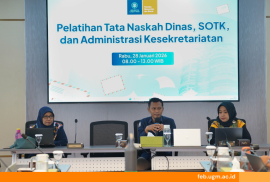Nowadays, the world is facing various socio-economic problems that are increasingly complex. For instance, during 2020, there were 114 million people who lost their jobs. There was an increase in depression rates of up to 31% and natural disasters caused by the worsening climate change on the world. In times like this, the government is demanded to take more roles in alleviating these problems. It is not easy to do, but the government is now making more efforts to encourage entrepreneurs to establish social ventures as an alternative solution to socio-economic problems.
Along with government efforts related to social entrepreneurship, researchers consistently continue to explore the factors that predict behavior and promote individuals’ intentions to create social entrepreneurship. We can call this factor social entrepreneurship intention which refers to the state of mind, specifically the desire and determination of the individual to pursue a social mission, that directs entrepreneurial actions in creating a social venture (Tiwari et al., 2017; Bacq and Alt, 2018). However, until now there is still an ongoing debate on whether social entrepreneurship is a manifestation of individual morality. Furthermore, recent studies deny that social entrepreneurship is not based on moral considerations because there are egoistic interests such as the interest for personal gain.
There is still a debate about those statements that make the researchers continuously test moral factors in predicting social entrepreneurial intention. A study was conducted to offer an alternative explanation and perhaps bridge this debate. This study examines whether the establishment of a social business is based on moral considerations using individual ethical decision-making theory. The process and the results of the research were published then as an article in the Journal of Business Venturing Insights entitled “Let ethics lead your way: The role of moral identity and moral intensity in promoting social entrepreneurial intention” by Widya Paramita, Nurul Indarti, Risa Virgosita, Rina Herani, and Bayu Sutikno.
Built according to Jones’ issue-contingent model (1991), the main objective of this study is to examine whether the social entrepreneurial intention is predicted by moral identity through ethical judgments. Moral identity refers to the degree of how important it is to be a moral person as an individual (Hardy and Carlo, 2011). Meanwhile, ethical judgment represents an individual evaluation of whether one decision is an ethical one or not. (Jones, 1991). The study also extended by examining the psychological proximity with social problems as a condition in which social entrepreneurial intention is regarded as ethical decision making.
This study contributes to the social entrepreneurship and ethical decision-making literature. Among those many identities the individuals can have, this study extends the findings of previous research. It shows that not only social identity and entrepreneurial identity influence social entrepreneurial intentions, but also moral identity. Second, this study establishes that social entrepreneurial intentions can also be seen as moral decisions because it shaped by ethical judgments of social entrepreneurial decisions. The individual’s social entrepreneurial intention can be considered as a moral decision depending on the moral qualities of the individual. Third, this study augments the literature by establishing a significant moderating effect of psychological affinity on the indirect relationship between moral identity and social entrepreneurial intentions.
To test the hypothesis, the researcher performed a regression analysis using the Ayes’ Macro Process by running two models for each hypothesis testing where Model 1 only tested the focus construct while Model 2 included control variables, namely, age and education. The results showed that moral identity was positively related to the moral judgment of the establishment of a social enterprise and the intention of establishing a social enterprise, only if the individual had a psychological affinity with the social problem. From these results, both opinions from previous studies are correct. The intention to establish a social business may or may not be based on moral considerations. It depends on the psychological closeness between the individual and the social problem. If the psychological proximity is high, then individuals with high moral identity will judge the establishment of a social business as ethical behavior and they will have a high intention to build a social business. If the psychological proximity is low, then moral identity and moral judgment will not affect the intention to establish social entrepreneurship.
—
Author of the paper: Widya Paramita, Nurul Indarti, Risa Virgosita, Rina Herani, dan Bayu Sutikno.
Published on Journal of Business Venturing Insights , Volume 17, June 2022, e00299.
Link https://www.sciencedirect.com/science/article/abs/pii/S2352673421000779




